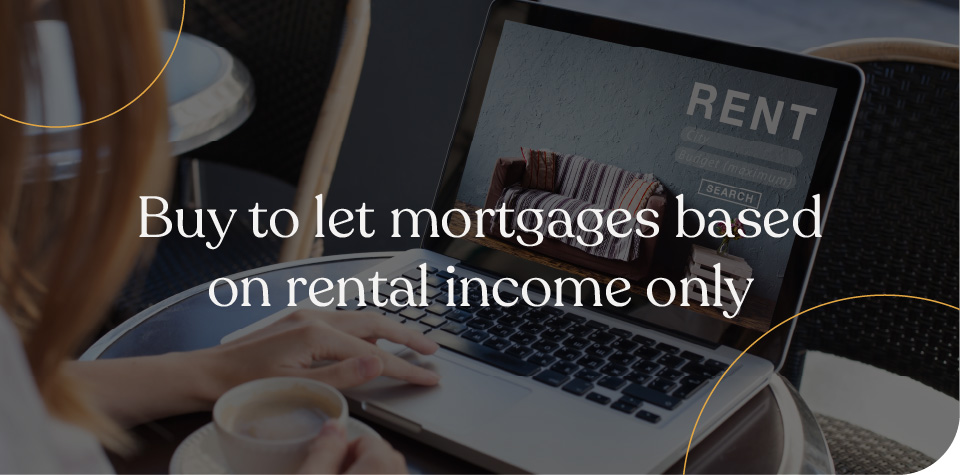
Buy to let mortgages based on rental income only
As a mortgage broker company, we get asked regularly by landlords about how to use rental income towards mortgage affordability and how much rental income you would need to show.
You may have used an online buy-to-let mortgage calculator for an estimate. Still, you require more concrete evidence as most mortgage providers lending for a buy-to-let property have strict policies, which can be challenging for many to qualify for a mortgage.
If you are a landlord who uses the rental income to get a mortgage, you may have several options, even if your application has been denied. We have a few mortgage providers lending buy-to-let mortgages. We provide mortgage advice free of charge.
To begin your mortgage application click the link below for mortgage advice. Our main aim is to have your mortgage approved. All of our mortgage brokers are registered by the FCA.
Get started online
Can rental income be used to get a mortgage?
You should be able to use rental income that you can prove through your accounts over the past three years to help you get a mortgage from several lenders. Verifying that the income is not just based on rental agreements or bank statements is essential.
You must be able to meet all eligibility and affordability criteria. These will vary from one lender to the next.
Rent income for residential mortgage or buy-to-let applications
Although you can use rental income for both residential and buy-to-let mortgage applications, there are some key differences in what lenders require depending on your property type.
While many lenders accept rental income, others require your approximate annual income verification to be approved for residential mortgages.
Buying a Buy-to-Let Property Many lenders will accept rental income from your bank statements even if it hasn’t been received for over 12 months. It will be easier for professional landlords with multiple properties to get mortgage lenders to accept rental income.
For residential mortgage applications, you will need to prove rental income.
Lenders will accept proof that you have employment income, as expected. Some even offer mortgages with overtime, bonuses and commission to help with an application.
However, the burden to prove this increases exponentially when self-employed or those who rely on multiple revenue streams to support their claims.
Lenders aren’t comfortable with counting rental income for mortgage applications based on bank statements or rental agreements. They require that the income be proven through self-employed accounts for at least three years.
Some lenders will accept two years worth of accounts. A few others may offer a self-employed mortgage based upon one year’s accounts if you plan to use rental income towards your home loan.
What is the problem?
Lenders don’t want rental income used to pay a mortgage. However, there are many reasons. The most important reason is that lenders view the acceptance of rental income as an exception to their criteria.
One example is the increasing emphasis on affordability and responsible lending over the past few years. This has resulted in a growing concern among lenders about the unpredictable nature of rental income and the possibility that a tenant will be displaced.
Furthermore, landlords sometimes provide anecdotal evidence suggesting lenders ignore income-generating properties even with verifiable data. It is not an income source, but it is not a liability.
We are expert mortgage brokers
We have access to over 200 lenders in the UK to get you the best rates
Start your application here
How does rental income affect mortgage qualification?
HMRC is the best way to obtain a mortgage with rental income. You will need to complete a Tax Calculation form (or SA302 form) and full accounts for limited businesses. This provides proof of rental income and tax owed.
What figures for rental income are used?
Sole-trader mortgages will only be lent against the amount of taxable earnings (or net profit) once mortgage payments, management fees and maintenance costs have been deducted.
Mortgages for company directors may be limited to income from dividends or salary. Other lenders may consider the net profit, whether it is drawn or not.
What is the minimum rental income required to get a mortgage for buy-to-let?
No matter if you are financing a buy-to-let mortgage using rental income from the property or capital from other properties or properties, lenders will need to see sufficient rental income to pay the mortgage. Typically, this is between 125-145%.
Are there other options?
There are many options for you to consider if you don’t have the income to prove earnings to obtain a mortgage buy-to-let using rental income. Let’s take a look at the most feasible ones.
Refinance an existing property
An alternative to using rental income to pay a mortgage is to refinance one or more rental properties and then recycle the money to finance a property purchase (or a larger deposit).
This is often done by taking out a mortgage loan. It allows landlords to have tax-free access to the property’s profits.
Most lenders will limit the amount of loan to value (or LTV) they will offer for these properties. This is typically 75%. Some lenders may consider offering up to 80% and some up to 85% depending on the circumstances.
The Bank of England has introduced new buy-to-let lending guidelines. Landlords with four or more mortgaged properties will need to give their lender detailed financial information about each property in their portfolio. This is due to the complexity of a landlord refinance.
Get started online
Joint residential mortgage
A joint application to obtain a residential mortgage for someone who is a spouse, family member, or friend is another option that landlords might consider. This is especially important for those who are unable to prove income.
These applications have similar income requirements as single-person applications. Lenders may refuse to lend to tenants as support capital, but the methods of calculating loan amounts can differ depending on the lender.
Some will multiply the earnings from the dominant ‘breadwinner’ and then add secondary incomes to make their decision. Others will combine both and multiply more on an ‘equal’ basis.
This means that applicants can choose to use one or both of these formulas depending on their financial situation. They could increase or decrease the amount offered.
Options for short-term financing
For landlords who require short-term financing options, a Bridging Loan, which can be used to quickly access funds (to purchase a property at auction for example) or to cover a cash shortage and who cannot use rental income to pay a residential mortgage, may be a good option.
However, these loans have higher interest rates than conventional mortgages. In advance, you will need to show a viable exit strategy (often a remortgage or sale).
They shouldn’t be overlooked as they provide a level of flexibility and understanding that is lacking in mainstream mortgage options.
Find a job
Although it might not sound appealing, lenders will not allow rental income to count towards mortgages in many instances. This makes it undoubtedly beneficial for professional landlords to have some other income from work.
What should I do if my rental income exceeds my mortgage payments?
Customers using rental income to pay their mortgage often contact us for tailored advice. They want to know their options if they have trouble making their monthly mortgage repayments. If their rental income is insufficient to cover their mortgage, they can get help.
First, speak with your mortgage advisor or mortgage lender. You might be able to transfer your product to a better mortgage deal or extend your term to lower monthly payments, depending on how flexible your lender is.
Click the link below for further help with a mortgage advisor for free advice from FCA-regulated experts.
Get started online
Can I get a commercial mortgage based on rental income?
There are commercial investment mortgages, which can be used to finance a commercial mortgage, so yes you can.
Alternatively, you may be able to apply for a mortgage commercially using rental capital from properties that you own.
This might be allowed by some lenders, but only if you own the BTL under the same company name as the applicant for the commercial mortgage or if it is part of a portfolio that the firm owns.
What amount of mortgage interest tax should I pay on rental income?
Over the years, the government will reform landlord mortgage interest tax relief.
From April 2020, landlords were no longer eligible for rental income deduction. They are no longer able to deduct their mortgage payments from their rental income.
For the upcoming tax years, this is what you need to do:
- 2018-19: Property owners may be eligible for 50% of their mortgage tax relief
- 2019-20: Property owners may be eligible for 25% of their mortgage tax relief
Talk to an expert on mortgages and rental income
Click the link below to speak with an online mortgage advisor. We will answer any questions you may have and then introduce you to a mortgage lender suitable for you.
Get started online
